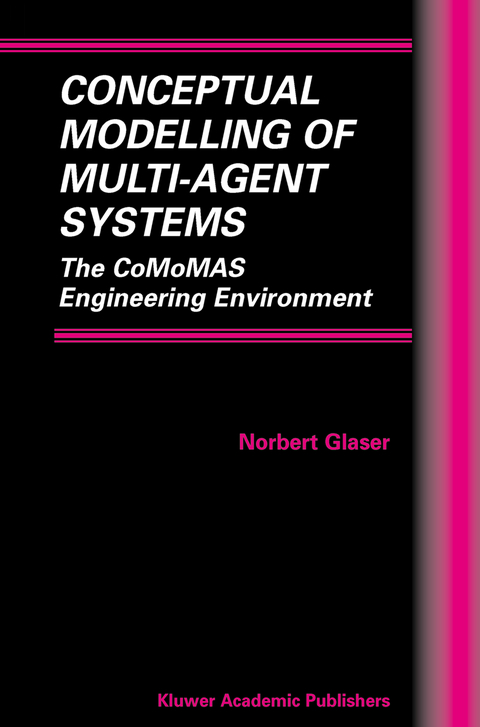
Conceptual Modelling of Multi-Agent Systems
Springer-Verlag New York Inc.
978-1-4020-7061-7 (ISBN)
Conceptual Modelling of Multi-Agent Systems is an excellent reference for both researchers and practitioners in the broad area of distributed systems development. This book is of particular value from the point of view of computer science, including knowledge engineering, artificial intelligence, agent and multi-agent technology, and software engineering.
1. Introduction.- 2. State of the Art : Agent Models and Architectures.- 1 Introduction.- 2 Characterisation of a Multi-Agent System (MAS).- 3 Hierarchical and Layered Architectures.- 4 Reactive and Real-Time Architectures.- 5 Heterogeneous, Cooperative and Social Architectures.- 6 Template-based and Generic Development Tools.- 7 Conclusion.- 3. State of the Art : Knowledge Acquisition and Modelling.- 1 Introduction.- 2 Historic Milestones.- 3 ComMet: Compositional Modelling.- 4 The KADS, CommonKADS and REFLECT project.- 5 COPILOTE: Flexible Control.- 6 ACKnowledge : Using General Directive Models.- 7 VITAL : Structured Model Development.- 8 CERISE : Two Acquisition Cycles.- 9 MACAO: Data-Driven and Model-Driven KA Approach.- 10 MIKE: Model-based and Incremental KE.- 11 The PROTÉGÉ Framework : Generation of KA-Tools.- 12 Conclusion.- 4. The Comomas Methodology.- 1 Introduction and Motivation.- 2 MAS Development: A Model-Based Approach.- 3 Reusing Knowledge during Development.- 4 Model-Driven Knowledge Acquisition.- 5 Tasks, Strategies and Methods at Run-Time.- 6 Comparison to MAS Engineering Methodologies.- 7 Conclusion.- 5. The Comomas Agent Engineering Toolkit.- 1 Introduction and Motivation.- 2 The CoMoMAS Architecture.- 3 The CoMoMAS Acquire and Modeller.- 4 The CoMoMAS Constructor and Coder.- 5 The GUI for Constructor and Coder.- 6 An Example.- 7 Comparison to KBS Engineering Environments.- 8 Conclusion.- 6. The Comomas Agent Validation Testbed.- 1 Introduction and Motivation.- 2 MICE: The Original Version.- 3 MICE 2.0: The Extended Version.- 4 Adaptation of MICE for Mobile Robot Simulation.- 5 Conclusion.- 7. A Case Study.- 1 Introduction and Motivation.- 2 The Nomad200 Robot.- 3 The Adaptive Intelligent Systems Model.- 4 The CoNomad Agent Architecture.- 5Reverse Engineering of the Agent Architectures.- 6 Conclusion.- 8. Conclusion and Perspectives.- Appendices.- Model Operators.- BNF specification of CML.- BNF specification of CML-M.
| Erscheint lt. Verlag | 31.5.2002 |
|---|---|
| Reihe/Serie | Multiagent Systems, Artificial Societies, and Simulated Organizations ; 4 |
| Zusatzinfo | XVIII, 265 p. |
| Verlagsort | New York, NY |
| Sprache | englisch |
| Maße | 155 x 235 mm |
| Themenwelt | Mathematik / Informatik ► Informatik ► Betriebssysteme / Server |
| Mathematik / Informatik ► Informatik ► Software Entwicklung | |
| Informatik ► Theorie / Studium ► Künstliche Intelligenz / Robotik | |
| ISBN-10 | 1-4020-7061-6 / 1402070616 |
| ISBN-13 | 978-1-4020-7061-7 / 9781402070617 |
| Zustand | Neuware |
| Haben Sie eine Frage zum Produkt? |
aus dem Bereich


